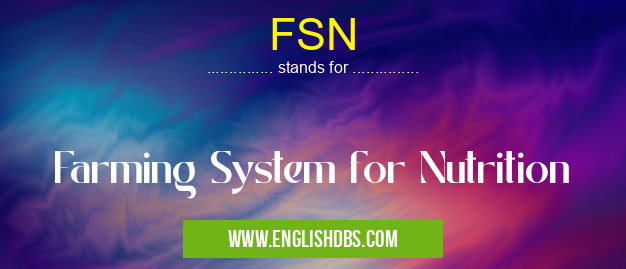What does FSN mean in DEVELOPMENT
The concept of Farming System for Nutrition (FSN) seeks to encompass a wide range of strategies and approaches that enable sustainable farming systems to contribute both to improved nutrition outcomes and enhanced food security. As such, the underlying principles of FSN are grounded in the intertwined relationships between food production, access to safe food supplies, nutritional diversity, and health outcomes. In order to maximize the impact of FSN, it is necessary to consider the economic, social, cultural, and environmental impacts that agricultural policies have on our global food system.

FSN meaning in Development in Community
FSN mostly used in an acronym Development in Category Community that means Farming System for Nutrition
Shorthand: FSN,
Full Form: Farming System for Nutrition
For more information of "Farming System for Nutrition", see the section below.
» Community » Development
Essential Questions and Answers on Farming System for Nutrition in "COMMUNITY»DEVELOPMENT"
What is FSN?
FSN stands for Farming System for Nutrition. It is an approach to agriculture that combines food production, nutrition, and health objectives in order to improve human nutrition and health outcomes.
How does FSN work?
FSN works by integrating agronomic practices with nutritional principles and health strategies in order to boost the nutrient content of key crops while also producing enough food for a family’s consumption. This can be achieved through agroecological practices such as crop diversification, intercropping, composting, soil amendment, crop rotation, integrated pest management (IPM), conservation agriculture, or participatory irrigation management (PIM).
What are the benefits of FSN?
The benefits of FSN include increased yields and income from food production systems that are more resilient to climate change; improved nutrition outcomes including increased access to safe and diverse diets; better natural resource management such as water conservation; reduced risk of disease; improved livelihoods among small-scale farmers; strengthened market linkages and value chains; and improved gender equity among involved households.
What do I need to get started with FSN?
To get started with FSN you will need local knowledge about the available resources including water sources, land fertility levels, pest prevalence etc., as well as a deep understanding of the local farming system including input supply sources, existing agricultural markets and common farming practices. You will also need access to basic tools for implementation such as machetes, hoes or hand tractors.
Is there any ongoing training or support I can access if I want to start implementing FSN?
Yes! Depending on your location there may be various training programs available that focus on teaching different aspects of FSN such as how to use agroecological techniques or how to create effective marketing plans. Many local organizations offer specialized support services so it’s always worth checking out what is available in your area. Additionally several government initiatives exist that offer funding opportunities for those interested in utilizing the principles of FSN.
How long does it take to see results when using this approach?
Results from implementing FSN vary depending on the type of system being implemented but typically farmers report seeing an improvement within six months or less due to more efficient use of resources such as water or fertilizer than in traditional farming techniques. If done properly this approach allows small-scale farmers increase their yields while also ensuring they have access safe and nutritious foods for their own consumption.
Are there any other approaches similar to FSN?
Yes! One popular approach similar to FS is agroecology which looks at balancing agricultural production with biodiversity protection by incorporating ecologically friendly practices into traditional farming techniques. Other approaches include sustainable intensification which seeks efficient ways of increasing crop yields without increasing inputs such as fertilizers/pesticides.
Are certain crops better suited for applying this methodology?
Generally root crops like cassava are particularly well suited for incorporating FS since they are highly nutritious but require fewer inputs than other types of crops like grains or vegetables. However many types of fruits/vegetables can still benefit from utilizing FS principles even if not all the nutrients found in these crops are retained after harvest.
What kind of impact has been observed from using this methodology?
Studies have shown that upon implementation households saw significant increases in dietary diversity resulting in improved nutrition outcomes overall which led to better overall health among the people involved. Additionally some communities reported higher income due to increases in crop yields allowing them access key markets they previously weren’t able tap into.
Final Words:
Farming System for Nutrition (FSN) is an important consideration for governments around the world that are looking for new ways to address critical issues related to global hunger and nutrition outcomes in rural agrarian settings. Through its diversified approach that focuses on improving soil fertility and water management while also promoting diverse dietary options among local populations, FSN aims to realize improved wellbeing through better access to nutritious foods and improved standards of living.
